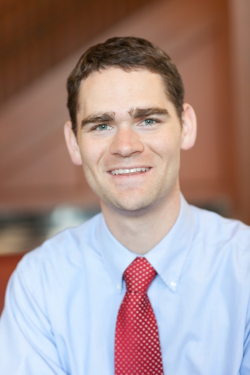The Secret Sauce of Learning
PROVO, Utah – Nov 03, 2022 – “Curiosity killed the cat” has long been a phrase that discourages inquisitiveness and one with which Ben Iverson would disagree. For Iverson, curiosity is what drives him to learn, and few things are more exciting to him than the prospect of a new discovery.
A finance professor at the BYU Marriott School of Business, Iverson didn’t always know what he wanted to study or to do with his life. He knew that he enjoyed the quantitative side of things, so he started his first semester at BYU as a civil engineering major. However, when he didn’t love his classes, he switched to mechanical engineering for his second semester, which also didn’t pan out.
After serving a mission for The Church of Jesus Christ of Latter-day Saints, Iverson returned to BYU and took a wide variety of classes with the hope that he would find something he could feel passionate about. Luckily for him, he enjoyed his first economics course and decided to stick with the program. Economics clicked with Iverson because of how it connects math with people. Studying economics allowed Iverson to use math to explore and improve how individuals make financial decisions. He decided to major in economics and double minor in math and business.
Iverson graduated from BYU in 2006 and accepted a job with the Federal Reserve Bank of New York where he worked in its research division. This was his first introduction to the academic research world. He enjoyed research so much, in fact, that he decided to go back to school for his PhD.
His desire to continue his education and earn a PhD represents a fundamental motivation in Iverson’s life. When looking back on his life and education, Iverson attributes his success to his curiosity about the world. “The world is full of people who are smarter than me and who work as hard as I do, or even harder. My secret sauce is I just want to know stuff,” Iverson says. He recognizes that his parents played a big role in his eagerness to learn, encouraging him to ask questions about everything.
Iverson feels that sometimes people of faith are afraid to ask hard questions, which can lead individuals down a path of anti-intellectualism. Asking hard questions about all aspects of life, including spirituality, is necessary, he says. In fact, he believes questions can help you grow in faith.
Some of the questions Iverson asks in his professional world focus on financial distress and restructuring, the topic of Iverson’s research at BYU. He finds finance the most interesting at the beginning and end of a company’s life. “Do you kill a company and let its employees find better jobs? Or do you restructure and try to help the company along?” he asks. “That's an interesting question, and financial economics play a key part in that process.”
Iverson’s current research deals with another aspect of finances: consumer bankruptcy and how families deal with the challenges that they face as a result of going bankrupt. One recent project that Iverson has worked on tackles issues related to racial bias in the bankruptcy process. He’s found some bias is at play when dealing with bankruptcy trustees and filers.
“When a White trustee is assigned a White filer versus a Black filer, the Black filer is much less likely to be able to navigate the process,” he explains. The contrasting experiences of Black and White filers fascinates Iverson, and his research opens the door to asking questions about race and bankruptcy.
“These are the people who need help,” he says. “Is the system helping them? What's a fair way for the system to help them?” Iverson asks these types of questions because he knows that the answers might change people’s lives. Through his research, Iverson seeks to make the process of bankruptcy fairer for everyone.
Finding answers to questions and sharing those answers with others has always been one of the aspects of his job that Iverson finds exciting. He’s able to share knowledge with a large variety of people, including his own students, audiences at research seminars, and even members of Congress. Sharing a new discovery brings a feeling of excitement that’s incomparable to him.
Iverson finds that his curiosity about the world, or his “secret sauce of learning,” helps him in all aspects of his life. “A big reason why I'm doing research is to help me be a better thinker and, in turn, that actually helps me be a better Christian and a better person overall,” he says.
Media Contact: Chad Little (801) 422-1512
Writer: Kaelin Hagen






